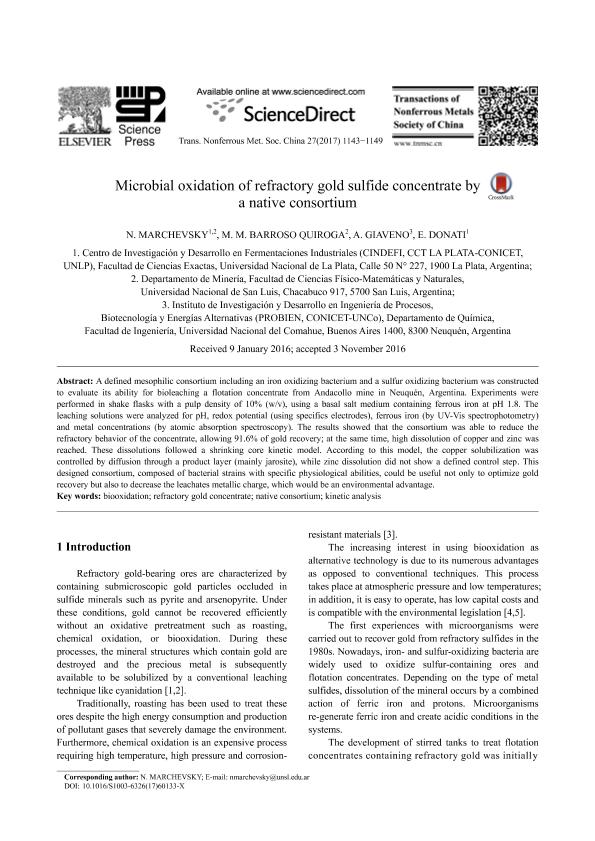Artículo
Microbial oxidation of refractory gold sulfide concentrate by a native consortium
Fecha de publicación:
05/2017
Editorial:
Elsevier Science
Revista:
Transactions of Nonferrous Metals Society of China
ISSN:
1003-6326
Idioma:
Inglés
Tipo de recurso:
Artículo publicado
Clasificación temática:
Resumen
A defined mesophilic consortium including an iron oxidizing bacterium and a sulfur oxidizing bacterium was constructed to evaluate its ability for bioleaching a flotation concentrate from Andacollo mine in Neuquén, Argentina. Experiments were performed in shake flasks with a pulp density of 10% (w/v), using a basal salt medium containing ferrous iron at pH 1.8. The leaching solutions were analyzed for pH, redox potential (using specifics electrodes), ferrous iron (by UV-Vis spectrophotometry) and metal concentrations (by atomic absorption spectroscopy). The results showed that the consortium was able to reduce the refractory behavior of the concentrate, allowing 91.6% of gold recovery; at the same time, high dissolution of copper and zinc was reached. These dissolutions followed a shrinking core kinetic model. According to this model, the copper solubilization was controlled by diffusion through a product layer (mainly jarosite), while zinc dissolution did not show a defined control step. This designed consortium, composed of bacterial strains with specific physiological abilities, could be useful not only to optimize gold recovery but also to decrease the leachates metallic charge, which would be an environmental advantage.
Archivos asociados
Licencia
Identificadores
Colecciones
Articulos(CINDEFI)
Articulos de CENT.DE INV EN FERMENTACIONES INDUSTRIALES (I)
Articulos de CENT.DE INV EN FERMENTACIONES INDUSTRIALES (I)
Citación
Marchevsky, Natalia Judith; Barroso Quiroga, Maria Martha; Giaveno, A.; Donati, Edgardo Ruben; Microbial oxidation of refractory gold sulfide concentrate by a native consortium; Elsevier Science; Transactions of Nonferrous Metals Society of China; 27; 5; 5-2017; 1143-1149
Compartir
Altmétricas




